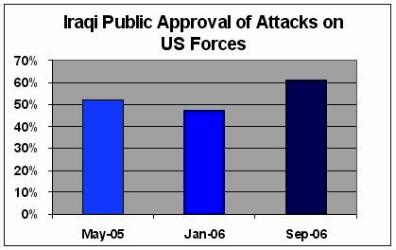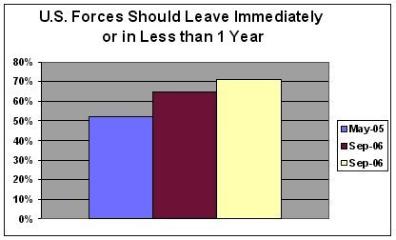Iraqi People to White House - Leave!
Michael Collins
“Scoop” Independent News
Washington, D.C.
You may have missed this. I did.
Most Iraqis Favor Immediate U.S. Pullout, Polls Show
Leaders' Views Out of Step With Public
By Amit R. Paley
Washington Post Staff Writer
Wednesday, September 27, 2006; A22BAGHDAD, Sept. 26 -- A strong majority of Iraqis want U.S.-led military forces to immediately withdraw from the country, saying their swift departure would make Iraq more secure and decrease sectarian violence, according to new polls by the State Department and independent researchers.
The White House maintained only one consistent goal throughout the invasion and occupation of Iraq: safety and democracy for the Iraqi people. That implies that we care what the Iraqi people think. Heard much about what the Iraqi people think lately? Ever?
I didn’t until I looked. The information wasn’t difficult to find and the sources on Iraqi public opinion are credible. USA Today did a 3,400 plus Iraqi poll in 2005, World Public Opinion.Org of the University of Maryland conducted a 1,150 poll in 2006, and the U.S. State Department ran its own poll of the Iraqi people in late 2006 as well. There are others.
As citizens of the United States, we are concerned about the safety of our troops, the impact of this war on the Iraqi people, and the overall cost of this lengthy and complex foreign adventure. We know that over 3,200 U.S. soldiers have died and many times that number have serious injuries. More of us need to know that between 450 and 650 thousand Iraqi civilians have died since the first moments of the invasion.
But what of the one consistent rationale for the invasion; the grandiose cause of bringing democracy to the Middle East and improving the lives of the Iraqi people?
If the benefits of the invasion are substantial and openly appreciated, we should find that our troops and personnel are welcomed by the people. If we are not welcome, then it’s obvious that Iraqi’s see our presence causing more harm than benefit. Who would argue with that? Isn’t respecting the popular will what democracy is all about?
A Majority of Iraqis Support Violent Attacks on
U.S. Forces
These figures answer any and
all questions about an ongoing occupation quickly and
decisively. Why isn’t this central to the debate and
decision making on our presence in Iraq? Since a majority
favors attacks on our soldiers, we must assume that a rapid
U.S. exit tops the Iraqi public opinion charts.

USA Today 5/05 - WPO.Org 1/06 - WPO.Org 9/06
This is outrageous. How can we ask our soldiers to serve extended duty in a nation where a majority of the people endorses to attacking them? Why isn’t this headline news daily? Why isn’t action on this clearly stated opinion at the center of the current debate on our future in Iraq? What on earth is any politician or governmental official thinking who supports staying in Iraq when a majority of Iraqis endorse attacks on U.S. forces?
Widespread exposure and analysis of this clearly stated opinion by the Iraqi people would change U.S. public opinion rapidly and permanently. Where are our leaders?
A Majority of Iraqis Want the United States Out Without Delay
The open support of deadly force against our troops is as much information as we need to reach a rational decision on leaving. It’s more than enough information to discard the absurd argument for an extended timetable prior to departure. But for the sake of the quibblers, who use any argument to prolong this tragic conflict, let’s see what the Iraqi’s think.

May 05 and 1st Sep 06 poll – immediate exit of US forces;
2nd Sep 06 poll – leave in less than 1 year.
USA Today 5/05 – US State Dept 9/06 - WPO.Org 9/06
In mid 2005 just over 50% of the Iraqi people wanted us out immediately. By September 2006, 65% wanted us out immediately according to a non published U.S. Department of State public opinion poll. Also in September 2006, the World Polling Organization released their findings showing 71% of Iraqis want us out in less than a year. The 71% figure was divided into segments: 37% preferring an exit in less than six months and 34% between six months and a year.
Withheld from the U.S.
public, the Washington Post gained access to the
U.S. State Department poll and published the most salient
result, out now. The Post headline above is a double
entendre of sorts: Leaders' Views Out of Step With
Public. While this refers to Iraqi leaders, it is just
as accurate a description of our leaders.
Our
domestic debate on a timetable is framed by the irony of
popular Iraqi opinion on the subject. By over a two to
one margin, 53% to 23%, the Iraqi people see a specific
timetable for a U.S. departure as benefiting the Iraqi
government. Given that, on what basis can U.S.
politicians argue that an extended timetable is necessary to
protect Iraqis? They see a timetable as beneficial to their
government.
Iraqi Objections to the Occupation
A positive attitude by Iraqi’s towards the U.S. presence was required whether the White House simply wanted oil or truly believed in a broader policy of liberating the Iraqi people, In fact, the war boosters predicted a jubilant welcome by the newly freed citizens. By a four to one margin, Iraqis view U.S. personnel as occupiers rather than liberators. A high percentage of Iraqis see the failure to provide adequate electricity and clean water as deliberate indifference on the part of the U.S. authorities. Few feel it’s safe to even talk to Coalition forces. This is just a part of the hostility to our presence by Iraq’s population.
A Question for U.S. Leaders and Politicians: What is your major malfunction?
Answer: You are indifferent to the opinion of the people whose nation you caused to be invaded and you now cause to be occupied. The results are a disaster. Convince us otherwise.
A majority of the people in Iraq:
- Endorse the use of violence against U.S. troops;
- Want us to leave very soon; and
- See the United States as indifferent to their suffering.
The White House is supposedly quite skilled at reading and using poll data. Members of Congress use poll data on a regular basis. Why can’t they do what nearly anyone can do; search for polls on Iraqi popular opinion and use that data to make rational choices?
Clearly, our leaders don’t care what Iraqi people think. What an odd approach. If you’re going to invade and conquer a nation, call it a liberation, and claim that it’s for the good of the people, you should at least be conversant with their opinions. Operating without this information is negligence; operating with it and continuing to talk about an exit timetable is cynical beyond words.
Leaving U.S. soldiers in the middle of a nation with such a violent response to our presence is a betrayal of the trust those soldiers have in their civilian leadership. The troops don’t get to pick their wars. They do what they pledged: faithfully execute the orders of their superiors under the assumption that military action is rational and necessary. This war was not rationally justified or planned and it was not and is not necessary.
Putting the U.S. public in a position where it continues to spend hundreds of billions of dollars on an unnecessary and failed war is also a betrayal.
The betrayal of the Iraqi people is ongoing. They despised the oppression of Saddam and they certainly can’t stand what many of them see as deliberate chaos created by the White House orchestrated occupation
We’ve been invited to leave. Prompt acceptance of this invitation addresses two needs. First, it’s our opportunity to leave soon, save lives, prevent more injuries, and stop the losses in a lost cause. Second, this may be the first step toward a rational relationship between the United States and Iraq in the future. The only requirement is that the leaders of both nations respect the prevailing will of their people – end this war and end it now. It’s called democracy.
END
Permission to reproduce in
whole or in part given attribution of authorship and a link
to this article in “Scoop” Independent
News.


 Binoy Kampmark: Condemning The Right To Self-Defence - Iran’s Retaliation And Israel’s Privilege
Binoy Kampmark: Condemning The Right To Self-Defence - Iran’s Retaliation And Israel’s Privilege Gordon Campbell: On The Making Of King Donald
Gordon Campbell: On The Making Of King Donald Binoy Kampmark: Rogue States And Thought Crimes - Israel Strikes Iran
Binoy Kampmark: Rogue States And Thought Crimes - Israel Strikes Iran Eugene Doyle: The West’s War On Iran
Eugene Doyle: The West’s War On Iran Richard S. Ehrlich: Deadly Border Feud Between Thailand & Cambodia
Richard S. Ehrlich: Deadly Border Feud Between Thailand & Cambodia Gordon Campbell: On Free Speech And Anti-Semitism
Gordon Campbell: On Free Speech And Anti-Semitism